 Parler
Parler Gab
Gab
Russia to build 6,000 drones by summer 2025
Now, Russia is making great headways in creating its own version of the Shahed manufactured domestically. Documents have revealed the existence of a facility deep within Russia, in the Tatarstan region's Alabuga Special Economic Zone. The documents show that the facility's engineers are not only trying to manufacture Russia's own version of the Shahed but are also attempting to improve on Iran's dated manufacturing techniques using Russian industrial expertise. Combining the existing technology behind the Shahed with Russian manufacturing expertise, the goal of this facility is to domestically build 6,000 drones by the summer of 2025. If successful in the endeavor, this would be enough to reverse the Russian Armed Forces' chronic shortages in combat and non-combat drones on the frontline, thanks to the steady stream of drones the West is flooding into Ukraine. The Post's current estimates suggest that the Alabuga facility is at least a month behind its schedule, thanks to the embargo against Russia and Iran depriving them both of critical components for manufacturing drones. Currently, the facility is only capable of reassembling drones provided by Iran. Its manufacturing capacity is limited to making only drone bodies, and researchers suggest that the facility is only able to manufacture a little over 100 drones per month. Despite the delays, former United Nations weapons inspector David Albright noted that when the Alabuga facility is complete, it could have "a drone developmental capability that exceeds Iran's." "Russia has a credible way of building over the next year or so a capability to go from periodically launching tens of imported Shahed-136 kamikaze drones against Ukrainian targets to more regularly attacking with hundreds of them," said Albright. Learn more about the use of drones in warfare at DroneWatchNews.com. Watch this short report on the capabilities of the Shahed-136 and what Russia is doing to modify and modernize the drone. This video is from the Cynthia's Pursuit of Truth channel on Brighteon.com.More related stories:
Zelensky warns war is coming to Russia as Moscow downs three more Ukrainian drones. Fully autonomous KILLER DRONES now closer to reality as rapid development of AI continues. Instance of AI-powered drone killing human operator did not actually happen – but it is a plausible scenario. Pentagon plans to launch a program that will develop DRONE SWARMS. Drone use is widening in Ukraine, bringing with it potential dawn of robotic killing machines. Sources include: Reuters.com MSN.com Brighteon.comBiden declares state of emergency in Florida as Tropical Storm Idalia approaches
By Arsenio Toledo // Share
Governments continue to obscure COVID-19 vaccine data amid rising concerns over excess deaths
By patricklewis // Share
Tech giant Microsoft backs EXTINCTION with its support of carbon capture programs
By ramontomeydw // Share
Germany to resume arms exports to Israel despite repeated ceasefire violations
By isabelle // Share










